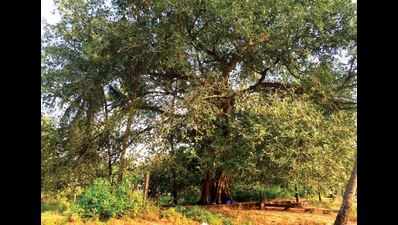Trending
This story is from November 24, 2017
Arambol’s drug den: 500m from beach, a banyan tree

The banyan tree at Girkar vaddo, Arambol
ARAMBOL: Away from the bustling tourists who flock the tranquil Arambol beach, a walk down a narrow lane from the main road at Girkar vaddo stands a banyan tree. Tucked away just 500m from the beach entrance, under its shade, a temporary structure for sitting makes it the perfect place to roll a joint or snort one.
And it is here that a group of 15-20 foreigners come every day and spend two hours in the morning and two in the evening—from 10 to 12 and then again from 4 to 6—making it the drug den for the season.
It is an exclusive group consisting of African nationals, mainly Nigerians, and not everyone has an invitation. A message is passed among the group and they all assemble under the banyan tree. No one knows where the drugs come from, where it is kept or even these drug addicts.
Locals reckon that roadside bushes and isolated areas not frequented by either the villagers or foreigners are the pickup joints. But no one dares to check it out, even the cops. Police have faced the gang’s brunt, and prefer to look the other way, say locals.
For the record, police have arrested two foreigners. But police officers, on condition of anonymity, blame it on lack of stringent rules to punish these foreigners who deal in drugs.
“On many occasions, we have arrested foreigners involved in drug trade. But they secure bail and soon, they are back in business. There are no deportation rules and they take advantage of it. There needs to be a proper deportation rule in place to weed out the problem,” says a police officer.
Residents say these African nationals do not stay in Arambol, as most refuse accommodation to them. But they move around freely in the area, even late at night, creating nuisance.
“They not only create nuisance in the area, but also harass other foreigners. This is hampering our business, as tourists prefer to stay away. Also, many girls are employed at various establishments during the tourist season. There is a risk to them too,” says a local shopkeeper.
The issue had dominated the gram sabha of the village panchayat of Arambol attended by local MLA Dayanand Sopte. “Drugs consumption will not be allowed,” Sopte told TOI.
In February 2013, TOI had first exposed how another banyan tree close to the sweet water lake had become a den for drugs. After the TOI exposure, the place was cleaned up. But in 2016, it came into focus again when a 24-year-old son of a businessman from Nagpur, who had come down for New Year celebrations, was found dead, allegedly from drug overdose.
And it is here that a group of 15-20 foreigners come every day and spend two hours in the morning and two in the evening—from 10 to 12 and then again from 4 to 6—making it the drug den for the season.
It is an exclusive group consisting of African nationals, mainly Nigerians, and not everyone has an invitation. A message is passed among the group and they all assemble under the banyan tree. No one knows where the drugs come from, where it is kept or even these drug addicts.
Locals reckon that roadside bushes and isolated areas not frequented by either the villagers or foreigners are the pickup joints. But no one dares to check it out, even the cops. Police have faced the gang’s brunt, and prefer to look the other way, say locals.
One evening, during the scheduled time for the drug addicts to assemble, when TOI reached the site, there wasn’t anyone in sight. A few minutes later, an African national approached only to scurry away and raise an alarm for the group not to make their appearance.
For the record, police have arrested two foreigners. But police officers, on condition of anonymity, blame it on lack of stringent rules to punish these foreigners who deal in drugs.
“On many occasions, we have arrested foreigners involved in drug trade. But they secure bail and soon, they are back in business. There are no deportation rules and they take advantage of it. There needs to be a proper deportation rule in place to weed out the problem,” says a police officer.
Residents say these African nationals do not stay in Arambol, as most refuse accommodation to them. But they move around freely in the area, even late at night, creating nuisance.
“They not only create nuisance in the area, but also harass other foreigners. This is hampering our business, as tourists prefer to stay away. Also, many girls are employed at various establishments during the tourist season. There is a risk to them too,” says a local shopkeeper.
The issue had dominated the gram sabha of the village panchayat of Arambol attended by local MLA Dayanand Sopte. “Drugs consumption will not be allowed,” Sopte told TOI.
In February 2013, TOI had first exposed how another banyan tree close to the sweet water lake had become a den for drugs. After the TOI exposure, the place was cleaned up. But in 2016, it came into focus again when a 24-year-old son of a businessman from Nagpur, who had come down for New Year celebrations, was found dead, allegedly from drug overdose.
End of Article
FOLLOW US ON SOCIAL MEDIA











